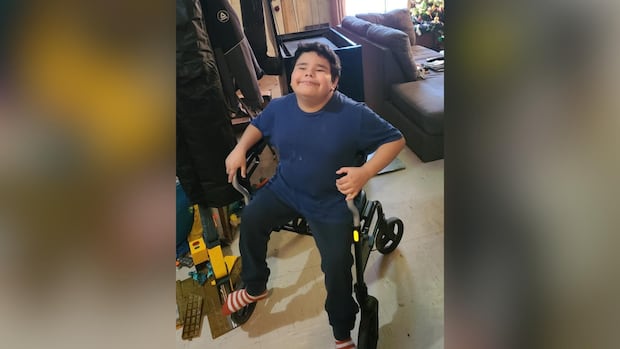
This boy hurt in collision didn't have an Indian status card, so Ottawa wouldn't pay for medical evacuation
CBC
The family of a seven-year-old boy from Deer Lake First Nation who was denied medical transportation coverage because he didn't yet have an Indian status card is calling for changes to Ottawa's Non-Insured Health Benefits (NIHB) program.
Jordan Harper was seriously injured, and his grandmother died, in January in a head-on collision with another vehicle on the winter road near the northwestern Ontario community. The Grade 2 student was airlifted to the Hamilton Health Sciences Centre, where two metal rods were put in his leg.
Last month, Jordan was supposed to have the rods removed, but his family was waiting for NIHB staff to book a scheduled medical evacuation from Deer Lake to Thunder Bay.
"His leg was all swollen from the rods," said Aretta Meekis, who described her stepson as smart and outgoing.
The family said they were told Jordan wasn't covered under NIHB because he didn't have an Indian status card, something his late grandmother — who was his primary caregiver — had been trying to get him.
"I was just crying that one day because they refused — they still refused the medevac and he was just in pain," his stepmom said. "He just turned seven, like, how can you refuse a child?"
About 1,100 people live in Deer Lake, a remote community that can only be accessed by plane or winter road.
After waiting more than a week to get him out of the community, the Oji-Cree First Nation's tribal council, Keewaytinook Okimakanak, paid to send him to Thunder Bay for the rod-removal surgery.
"We're hearing stories like that all over — community chiefs paying for things, health directors paying for things," said Monica Hemeon, vice-president of regional services for the Sioux Lookout First Nations Health Authority (SLFNHA).
SLFNHA provides health services to 33 First Nations — 28 of them are remote.
The NIHB program provides coverage to First Nations and Inuit people across Canada for a number of health benefits that aren't already covered under social programs, private insurance plans, or provincial or territorial health insurance.
This includes medical transportation to access services that aren't available in their communities.
In order to qualify, clients must live in Canada and be at least one of the following:
Jordan's stepmom questions why, considering the urgency of the care Jordan needed, an exception couldn't be made while his family finished completing his status Indian card application. The process is still in the works — the family's efforts to get him the card were delayed as they dealt with the accident.













